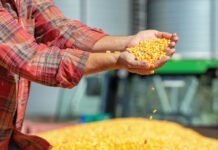Soyabean prices have seen an exceptional increase over the last few months. The oilseed, which is grown extensively in Madhya Pradesh and Maharashtra among other states, has traded well above its government-declared Minimum Support Price of Rs 3,880 per quintal.
A recommendation by an officer of the state Animal Husbandry department, to allow duty-free import of soya meal, has raised concerns in the industry. Other than the practical difficulties involved in imports, this ‘recommendation’ has come when the acreage of soyabean is supposed to increase in the upcoming kharif season.
On Tuesday, Dr Gagan Garg, assistant commissioner, (trade), in the Animal Husbandry and Fisheries department, issued an office memorandum to the under secretary of the Department of Commerce, recommending duty-free import of 12 lakh tonnes of soyameal This recommendation was in response to a representation made by the All India Poultry Breeders and Farmers Association (AIPBFA), which had raised the issue early in April. Garg’s letter had also requested regulation of soyabean commodity trade on commodity exchanges, which would end speculation-driven surge in soyabean prices.
Soyabean prices have seen an exceptional increase over the last few months. The oilseed, which is grown extensively in Madhya Pradesh and Maharashtra among other states, has traded well above its government-declared Minimum Support Price of Rs 3,880 per quintal.At Latur’s wholesale market, the average trading price of the oilseed for most of April was above a historical high of Rs 7,000 per quintal.
Soyameal — the solid protein rich mass residue left after oil is expelled from the seed — forms the raw material of the poultry feed industry. The industry, which had felt the pinch of the price rise, had expressed its concerns in the letter.
This recommendation by the Animal husbandry department has raised many questions, according to soyabean solvent and extractors. Other than India, Ukraine and to a lesser extent Brazil grow non genetically-modified soyabean. Thus the availability of 12 lakh tonnes of soyameal in the international market itself is a question. “Once the meals are contracted, it will take more than two months before they lands in India. It will land right in the middle of the soyabean planting season, which would affect the farmer’s earning,” said a Dhule-based solvent and extractor.
Many in the industry have pointed out how the country at present has over 35 lakh tonnes of soyabean with farmers, traders or oil extractors and there is no question of paucity in raw material. “What is necessary is to correct the unhealthy speculative work in the markets which has affected every one. Imports can’t be an answer when we are trying to become self-sufficient in oilseeds,” said another industry insider.
Edible oil is the third highest contributor to India’s import basket and sustained efforts are being made to achieve reduced import dependency.













